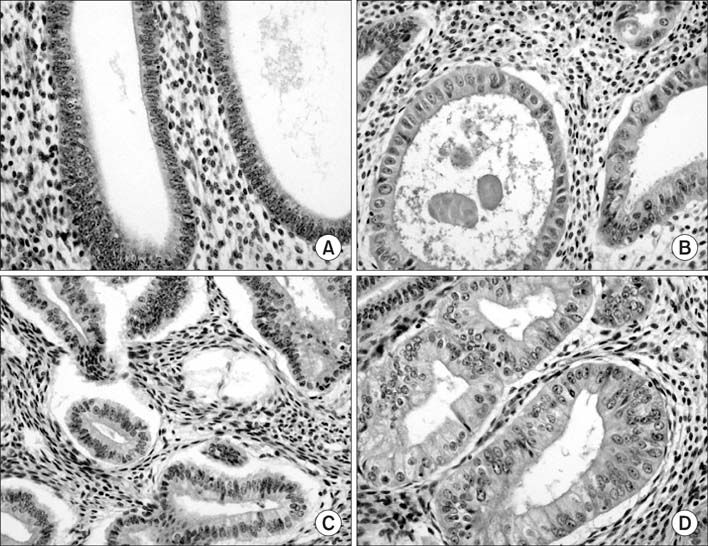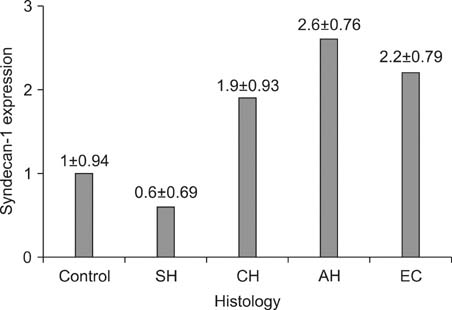J Gynecol Oncol.
2010 Mar;21(1):50-55. 10.3802/jgo.2010.21.1.50.
The expression of syndecan-1 is related to the risk of endometrial hyperplasia progressing to endometrial carcinoma
- Affiliations
-
- 1Department of Obstetrics and Gynecology, Ajou University School of Medicine, Suwon, Korea. hsryu@ajou.ac.kr
- 2Department of Thoracic/Head and Neck Medical Oncology, The University of Texas, MD Anderson Cancer Center, Houston, TX, USA.
- 3Department of Pathology, Ajou University School of Medicine, Suwon, Korea.
- 4Department of Molecular Science and Technology, Ajou University School of Medicine, Suwon, Korea.
- KMID: 2173513
- DOI: http://doi.org/10.3802/jgo.2010.21.1.50
Abstract
OBJECTIVE
Aberrant expression of the cell surface proteoglycan, syndecan-1, is found in many malignancies. The current study describes the immunohistochemical study of syndecan-1 expression in normal, hyperplastic, and malignant endometrial tissues for evaluation of application as a parameter of cancer progression in patients with endometrial hyperplasia. METHODS: Immunohistochemical staining of syndecan-1 was performed in 101 formalin fixed, paraffin embedded sections of normal, hyperplastic, and malignant endometrial tissues. We analyzed specimens from patients with normal endometrium (NE, N=10) as controls, and those of simple hyperplasia (SH, N=20), complex hyperplasia without atypia (CH, N=20), atypical hyperplasia (AH, N=20), and endometrial cancer (EC, N=31). RESULTS: The mean rank of expression scores based on the frequency of syndecan-1 staining were 31.6, 20.5, 52.9, 72.1, and 62.1 for NE, SH, CH, AH and EC, respectively (p<0.001). Syndecan-1 expression was significantly greater in CH (p<0.001) or AH (p<0.001) than in SH, and significantly greater in AH compared to CH (p=0.028). Syndecan-1 is more frequently expressed in CH (p=0.042), AH (p<0.001), or EC (p=0.002) than in NE. Syndecan-1 expression did not differ significantly between NE and SH (p=0.248). CONCLUSION: Syndecan-1 expression appears to be useful as a predictive indicator in endometrial hyperplasia.
MeSH Terms
Figure
Reference
-
1. Lee SE, Kim JW, Park NH, Song YS, Kang SB, Lee HP. Contemporary trends of endometrial cancer in Korean women. Korean J Gynecol Oncol. 2005. 16:215–220.2. Jemal A, Siegel R, Ward E, Murray T, Xu J, Smigal C, et al. Cancer statistics, 2006. CA Cancer J Clin. 2006. 56:106–130.3. Silverberg SG, Mutter GL, Kurman RJ, Kubik-Huch RA, Nogales F, Tavassoli FA. Tavassoli FA, Stratton MR, editors. Tumors of the uterine corpus: epithelial tumors and related lesions. WHO classification of tumors: pathology and genetics of tumors of the breast and female genital organs. 2003. Lyon: IARC Press;221–232.4. Kurman RJ, Kaminski PF, Norris HJ. The behavior of endometrial hyperplasia: a long-term study of "untreated" hyperplasia in 170 patients. Cancer. 1985. 56:403–412.5. Kendall BS, Ronnett BM, Isacson C, Cho KR, Hedrick L, Diener-West M, et al. Reproducibility of the diagnosis of endometrial hyperplasia, atypical hyperplasia, and well-differentiated carcinoma. Am J Surg Pathol. 1998. 22:1012–1019.6. Druker BJ, Lydon NB. Lessons learned from the development of an abl tyrosine kinase inhibitor for chronic myelogenous leukemia. J Clin Invest. 2000. 105:3–7.7. Choi DS, Kim JH, Ryu HS, Kim HC, Han JH, Lee JS, et al. Syndecan-1, a key regulator of cell viability in endometrial cancer. Int J Cancer. 2007. 121:741–750.8. Anttonen A, Kajanti M, Heikkila P, Jalkanen M, Joensuu H. Syndecan-1 expression has prognostic significance in head and neck carcinoma. Br J Cancer. 1999. 79:558–564.9. Mikami S, Ohashi K, Usui Y, Nemoto T, Katsube K, Yanagishita M, et al. Loss of syndecan-1 and increased expression of heparanase in invasive esophageal carcinomas. Jpn J Cancer Res. 2001. 92:1062–1073.10. Pulkkinen JO, Penttinen M, Jalkanen M, Klemi P, Grenman R. Syndecan-1: a new prognostic marker in laryngeal cancer. Acta Otolaryngol. 1997. 117:312–315.11. Matsumoto A, Ono M, Fujimoto Y, Gallo RL, Bernfield M, Kohgo Y. Reduced expression of syndecan-1 in human hepatocellular carcinoma with high metastatic potential. Int J Cancer. 1997. 74:482–491.12. Anttonen A, Heikkila P, Kajanti M, Jalkanen M, Joensuu H. High syndecan-1 expression is associated with favourable outcome in squamous cell lung carcinoma treated with radical surgery. Lung Cancer. 2001. 32:297–305.13. Fujiya M, Watari J, Ashida T, Honda M, Tanabe H, Fujiki T, et al. Reduced expression of syndecan-1 affects metastatic potential and clinical outcome in patients with colorectal cancer. Jpn J Cancer Res. 2001. 92:1074–1081.14. Numa F, Hirabayashi K, Kawasaki K, Sakaguchi Y, Sugino N, Suehiro Y, et al. Syndecan-1 expression in cancer of the uterine cervix: association with lymph node metastasis. Int J Oncol. 2002. 20:39–43.15. Chen CL, Ou DL. Expression of syndecan-1 (CD138) in nasopharyngeal carcinoma is correlated with advanced stage and poor prognosis. Hum Pathol. 2006. 37:1279–1285.16. Barbareschi M, Maisonneuve P, Aldovini D, Cangi MG, Pecciarini L, Angelo Mauri F, et al. High syndecan-1 expression in breast carcinoma is related to an aggressive phenotype and to poorer prognosis. Cancer. 2003. 98:474–483.17. Zellweger T, Ninck C, Mirlacher M, Annefeld M, Glass AG, Gasser TC, et al. Tissue microarray analysis reveals prognostic significance of syndecan-1 expression in prostate cancer. Prostate. 2003. 55:20–29.18. Ito Y, Yoshida H, Nakano K, Takamura Y, Miya A, Kobayashi K, et al. Syndecan-1 expression in thyroid carcinoma: stromal expression followed by epithelial expression is significantly correlated with dedifferentiation. Histopathology. 2003. 43:157–164.19. Bernfield M, Kokenyesi R, Kato M, Hinkes MT, Spring J, Gallo RL, et al. Biology of the syndecans: a family of transmembrane heparan sulfate proteoglycans. Annu Rev Cell Biol. 1992. 8:365–393.20. Soukka T, Pohjola J, Inki P, Happonen RP. Reduction of syndecan-1 expression is associated with dysplastic oral epithelium. J Oral Pathol Med. 2000. 29:308–313.21. Mukunyadzi P, Liu K, Hanna EY, Suen JY, Fan CY. Induced expression of syndecan-1 in the stroma of head and neck squamous cell carcinoma. Mod Pathol. 2003. 16:796–801.22. Kurokawa H, Matsumoto S, Murata T, Yamashita Y, Tomoyose T, Zhang M, et al. Immunohistochemical study of syndecan-1 down-regulation and the expression of p53 protein or Ki-67 antigen in oral leukoplakia with or without epithelial dysplasia. J Oral Pathol Med. 2003. 32:513–521.23. Hunter JE, Tritz DE, Howell MG, DePriest PD, Gallion HH, Andrews SJ, et al. The prognostic and therapeutic implications of cytologic atypia in patients with endometrial hyperplasia. Gynecol Oncol. 1994. 55:66–71.24. Amant F, Moerman P, Neven P, Timmerman D, Van Limbergen E, Vergote I. Endometrial cancer. Lancet. 2005. 366:491–505.
- Full Text Links
- Actions
-
Cited
- CITED
-
- Close
- Share
- Similar articles
-
- The Correlation of Syndecan-1 Expression and Pathologic Risk Factors in Endometrial Carcinoma
- Expression of p53 Gene in the Endometrial Hyperplasia and Andenocarcinoma
- Expression of CD44 Variant 6 (V6) in endometrial cancer, endometrial hyperplasia, and normal endometrium
- Bcl-2 Expression in Endometrial Hyperplasia and Carcinoma
- Comparison of cyclooxygenase-2 and p53 expression in normal endometrium, endometrial hyperplasia and endometrial cancer




